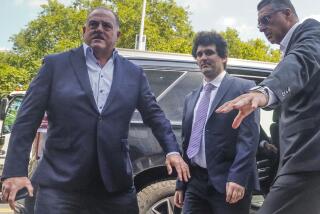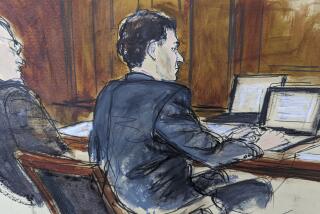Ex-Tyco Chief’s Lavish Lifestyle Is Defended
- Share via
NEW YORK — The former head of Tyco International Ltd. was paid huge amounts and lived an extravagant life, but he did not bilk the company to finance his lifestyle, his lawyer told jurors Monday in closing arguments of the long-running corporate fraud case.
Though L. Dennis Kozlowski borrowed money from Tyco to purchase such items as jewelry and artwork, his lawyer, Stephen Kaufman, told a packed courtroom that the deposed chief executive repaid his debts and always worked in Tyco’s best interests.
“Dennis Kozlowski is not a robber. He is not a thief,” Kaufman said. “And he never stole from the company.”
Kozlowski and Mark Swartz, Tyco’s ex-finance chief, are charged in state Supreme Court with looting Tyco of $170 million by paying themselves unauthorized bonuses and by forgiving huge loans they had taken from the company. They’re charged with stealing another $430 million by selling Tyco stock that was artificially inflated because of misleading disclosures about their pay, among other things.
Prosecutors allege that Kozlowski and Swartz circumvented the company’s board of directors, who were the only people authorized to grant the payouts. Kozlowski and Swartz each face more than 25 years in prison if convicted.
In the aftermath of Martha Stewart’s conviction two weeks ago, the Tyco trial has taken center stage in the government crackdown on alleged corporate miscreants. Although Stewart had a higher profile, the Tyco trial is in some ways more important to the government campaign. It is the first in an expected series of courtroom showdowns in which prosecutors are trying to prove that executives enriched themselves at shareholder expense.
Throughout the six-month trial, prosecutors painted Kozlowski’s lifestyle as gaudy even by the standards of the late 1990s. Kaufman immediately took aim at that portrayal, saying prosecutors tried to prejudice the jury.
“Whether you agree with that lifestyle or you disagree with that lifestyle, it is not a criminal act,” Kaufman said. “He had a right to spend his money any way he wanted. He could spend it on jewelry. He could spend it on yachts.”
The prime exhibit of Kozlowski’s lavish tastes was a videotape of a Roman-themed birthday party he threw for his wife in Sardinia in 2001. Kozlowski convened a Tyco board meeting on the island at the same time, but prosecutors say that was just a pretext so that Tyco would pick up half the tab for the $2-million bash.
“Sardinia may have been one of the 10 best videos of the year or one of the 10 worst,” Kaufman said, adding that Kozlowski told his staff to bill him for his share of the party.
Reprising a theme that Swartz’s attorney sounded during his closing argument last week, Kaufman said repeatedly that Kozlowski never tried to hide his bonuses or loans from the board. “What he did was open, candid, visible, disclosed,” Kaufman said. “That’s not how a thief operates.”
Kaufman blamed Tyco’s board for any excesses. Several directors have testified that they did not know the extent of Kozlowski’s pay or loan forgiveness. But Kaufman said directors gave Kozlowski full authority over those matters, and claimed that they are now blaming him to blunt their own liability.
More to Read
Inside the business of entertainment
The Wide Shot brings you news, analysis and insights on everything from streaming wars to production — and what it all means for the future.
You may occasionally receive promotional content from the Los Angeles Times.










